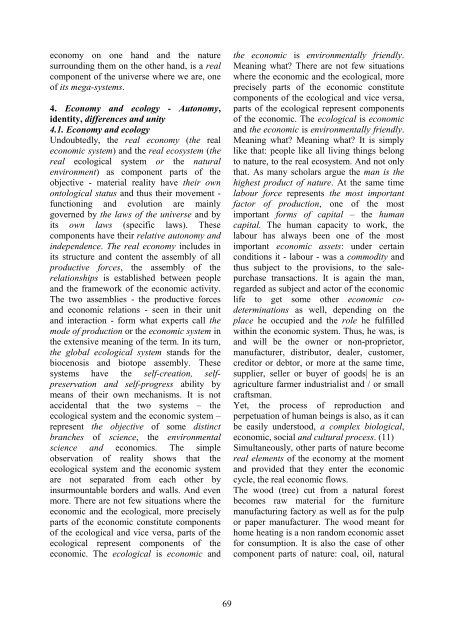Selected papers~ SPECIAL EDITION - Index of
Selected papers~ SPECIAL EDITION - Index of
Selected papers~ SPECIAL EDITION - Index of
You also want an ePaper? Increase the reach of your titles
YUMPU automatically turns print PDFs into web optimized ePapers that Google loves.
economy on one hand and the nature<br />
surrounding them on the other hand, is a real<br />
component <strong>of</strong> the universe where we are, one<br />
<strong>of</strong> its mega-systems.<br />
4. Economy and ecology - Autonomy,<br />
identity, differences and unity<br />
4.1. Economy and ecology<br />
Undoubtedly, the real economy (the real<br />
economic system) and the real ecosystem (the<br />
real ecological system or the natural<br />
environment) as component parts <strong>of</strong> the<br />
objective - material reality have their own<br />
ontological status and thus their movement -<br />
functioning and evolution are mainly<br />
governed by the laws <strong>of</strong> the universe and by<br />
its own laws (specific laws). These<br />
components have their relative autonomy and<br />
independence. The real economy includes in<br />
its structure and content the assembly <strong>of</strong> all<br />
productive forces, the assembly <strong>of</strong> the<br />
relationships is established between people<br />
and the framework <strong>of</strong> the economic activity.<br />
The two assemblies - the productive forces<br />
and economic relations - seen in their unit<br />
and interaction - form what experts call the<br />
mode <strong>of</strong> production or the economic system in<br />
the extensive meaning <strong>of</strong> the term. In its turn,<br />
the global ecological system stands for the<br />
biocenosis and biotope assembly. These<br />
systems have the self-creation, selfpreservation<br />
and self-progress ability by<br />
means <strong>of</strong> their own mechanisms. It is not<br />
accidental that the two systems – the<br />
ecological system and the economic system –<br />
represent the objective <strong>of</strong> some distinct<br />
branches <strong>of</strong> science, the environmental<br />
science and economics. The simple<br />
observation <strong>of</strong> reality shows that the<br />
ecological system and the economic system<br />
are not separated from each other by<br />
insurmountable borders and walls. And even<br />
more. There are not few situations where the<br />
economic and the ecological, more precisely<br />
parts <strong>of</strong> the economic constitute components<br />
<strong>of</strong> the ecological and vice versa, parts <strong>of</strong> the<br />
ecological represent components <strong>of</strong> the<br />
economic. The ecological is economic and<br />
69<br />
the economic is environmentally friendly.<br />
Meaning what? There are not few situations<br />
where the economic and the ecological, more<br />
precisely parts <strong>of</strong> the economic constitute<br />
components <strong>of</strong> the ecological and vice versa,<br />
parts <strong>of</strong> the ecological represent components<br />
<strong>of</strong> the economic. The ecological is economic<br />
and the economic is environmentally friendly.<br />
Meaning what? Meaning what? It is simply<br />
like that: people like all living things belong<br />
to nature, to the real ecosystem. And not only<br />
that. As many scholars argue the man is the<br />
highest product <strong>of</strong> nature. At the same time<br />
labour force represents the most important<br />
factor <strong>of</strong> production, one <strong>of</strong> the most<br />
important forms <strong>of</strong> capital – the human<br />
capital. The human capacity to work, the<br />
labour has always been one <strong>of</strong> the most<br />
important economic assets: under certain<br />
conditions it - labour - was a commodity and<br />
thus subject to the provisions, to the salepurchase<br />
transactions. It is again the man,<br />
regarded as subject and actor <strong>of</strong> the economic<br />
life to get some other economic codeterminations<br />
as well, depending on the<br />
place he occupied and the role he fulfilled<br />
within the economic system. Thus, he was, is<br />
and will be the owner or non-proprietor,<br />
manufacturer, distributor, dealer, customer,<br />
creditor or debtor, or more at the same time,<br />
supplier, seller or buyer <strong>of</strong> goods| he is an<br />
agriculture farmer industrialist and / or small<br />
craftsman.<br />
Yet, the process <strong>of</strong> reproduction and<br />
perpetuation <strong>of</strong> human beings is also, as it can<br />
be easily understood, a complex biological,<br />
economic, social and cultural process. (11)<br />
Simultaneously, other parts <strong>of</strong> nature become<br />
real elements <strong>of</strong> the economy at the moment<br />
and provided that they enter the economic<br />
cycle, the real economic flows.<br />
The wood (tree) cut from a natural forest<br />
becomes raw material for the furniture<br />
manufacturing factory as well as for the pulp<br />
or paper manufacturer. The wood meant for<br />
home heating is a non random economic asset<br />
for consumption. It is also the case <strong>of</strong> other<br />
component parts <strong>of</strong> nature: coal, oil, natural


